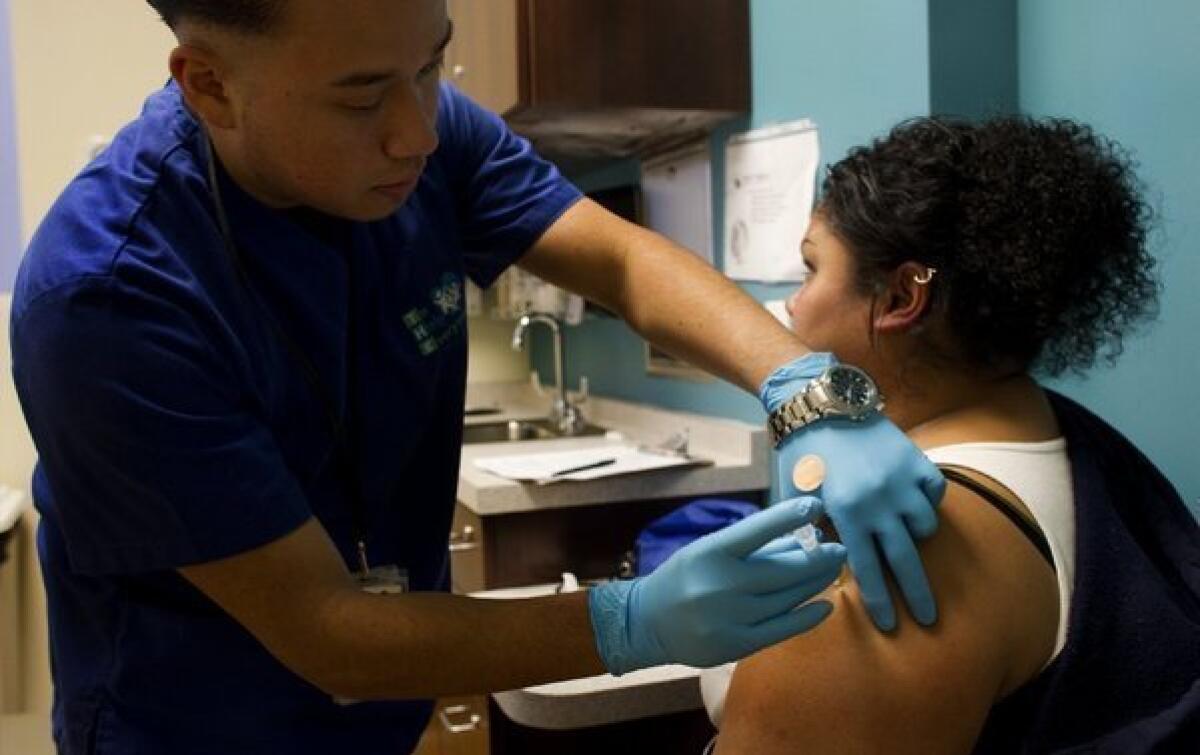‘Immunize, immunize!’: Doctors counter doubts about flu vaccines

- Share via
As waiting rooms in other parts of the U.S. have been clogged with sniffling, feverish hordes, California has seemed to avoid the worst of this year’s flu — so far.
But that may change, as officials in California said this week that flu activity in the state had reached “a widespread level,” and that the number of visits to doctors and hospitals for the treatment of flu-like illness was higher than usual for mid-January.
(For more on the flu’s spread West, read this report from Los Angeles Times writer Anna Gorman.)
There is still plenty people can do to prevent themselves and others from getting sick this winter, including washing hands often and staying home when they’re ill.
Also, of course, there’s vaccination. Despite reports of spot shortages at pharmacies and other locations, there’s still plenty of flu vaccine to go around, officials say. And as for arguments that the flu shot is somehow dangerous (hat-tip to Keith Kloor at the Collideascape blog), years of evidence have shown that it is safe and effective, if not perfect.
Still, many people don’t bother getting vaccinated. The U.S. Centers for Disease and Control and Prevention reported in November that fewer than half of American children and adults were immunized during the early part of the flu season.
Hoping to boost those numbers, Drs. Thomas R. Talbot and H. Keipp Talbot of the Vanderbilt University Department of Medicine in Nashville, writing Friday in the journal JAMA, argued against some of the rationales people provide for not getting their flu jab.
Some complain, for example, that the vaccine doesn’t work—citing reports like this one from the CDC, which showed that this year’s vaccine appears to be 62% effective. True, Talbot and Talbot wrote, the influenza vaccine is not as effective as other common vaccines. But, they added,
“not as effective” does not mean “not effective”...a prevention measure that reduced the risk of a serious outcome by 60% in most instances would be a noted achievement; yet for influenza vaccine, it is seen as a “failure.”
Flu vaccines do not cause flu, the physicians wrote, noting that even though people might get sick in the days after a vaccination,
This does not mean the illness was vaccine induced but rather was likely due to a noninfluenza viral infection…exposure to influenza before immunity from the vaccine had time to develop, or the fact that the vaccine is not 100% effective.
Egg allergies are no longer necessarily a reason to avoid flu shots, they noted —neither is being pregnant, having an underlying medical condition, or living with an immune-compromised person. As for the arguments of people who avoid their flu shot because they are healthy and never get the illness, they countered,
This rationale neglects one of the major reasons vaccination is recommended. While some people, such as healthy adults, may not develop a classic, severe influenza-like illness when infected (and a substantial proportion may have minimal to no symptoms), they likely still can transmit the virus to others. Refusing vaccination because of a perceived low risk ignores the potential risk to close contacts.
“The approach should be to immunize, immunize, immunize!” they concluded.






